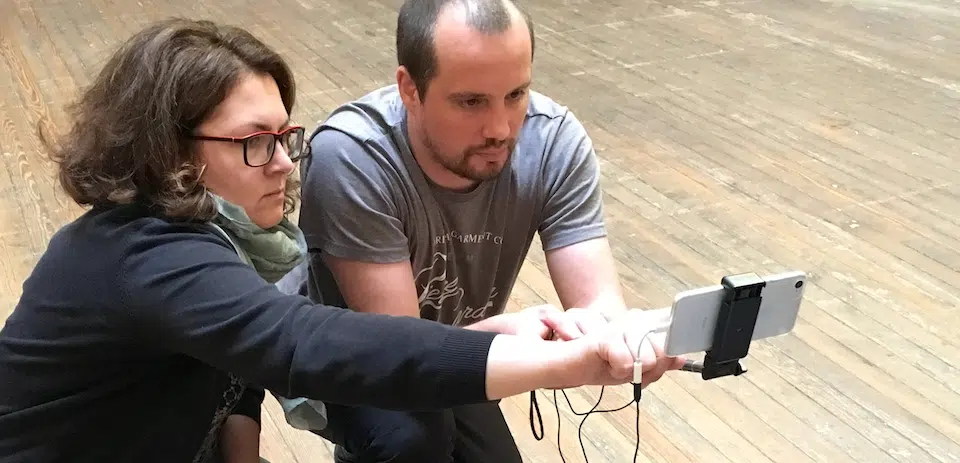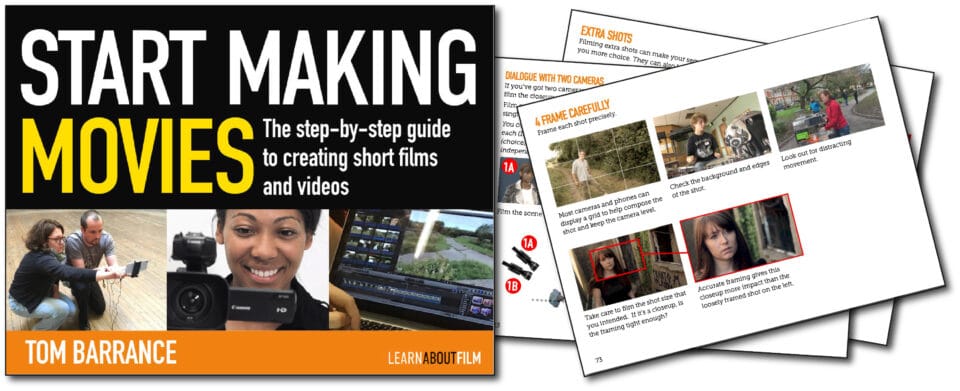How Do I Edit Videos on Iphone 6s

What kind of video can you make?
You can shoot pretty much any kind of film with an iOS device. But if you're planning to shootandedit on your phone, it's best to keep the movie short and simple. It's tricky to manage a long, complex movie on a phone or tablet.
Key tips
Edit on a computer if you can
You can shoot and edit on your iPhone or iPad. Or you can shoot on iPhone and edit on iPad: that's useful if you need to edit in the field. But computer editing apps can do much more than the mobile versions. If you have a Mac, it's a no-brainer: the desktop version of iMovie is much more flexible than the iOS version.
You'll need plenty of light
Phone cameras have tiny sensors. They aren't good in low light, or with a lot of contrast. So try to film where there's plenty of light and where it's not too contrasty. Shoot away from the light, or use reflectors to reduce the contrast. If you have to shoot in low light, you could put your phone in a case and mount a small light on it.
Get the sound right
The other big drawback with mobile devices is their tiny microphones. There are three main options for better audio: forget live sound, get in close to make the most of the built-in mic, or use a separate microphone.
- The easiest option is to create a film that doesn't need live sound: add a voiceover when you edit, or create a digital story where you edit images to a pre-recorded soundtrack.
- If you have to record with the built-in mic, get in close.
- Use an affordable lavalier microphone, or mount a wireless or directional mic on a phone case.
Keep it still
Shaky footage looks terrible, and phones are hard to hold steady in horizontal ('landscape') mode. Use a simple clamp like the Joby M-Pod, or a more solid one like the Shoulderpod. Learn to hold your phone steady (rest your upper arms against your body and try to be relaxed). If you can afford it, an electronic stabiliser will make a big difference.
>iPhones, iPads, accessories and apps for filmmaking
>36 ways to get the best out of your iPhone/iPad camera
Factual film example from Tom Barrance on Vimeo.
This factual film intro is based on interviews and cutaways, and uses the Ken Burns effect to zoom in on images. Play through to the second version for explanations of the techniques. There's more detail here:Elements of a factual film.
Making your movie or video
Making an iPhone movie is like making any other kind of film. You need to plan it carefully, shoot separate shots, pay attention to sound, and think about your audience.
1 Plan your film
Think about why you're making the film and what you want to say. Can you summarise your idea in a tweet? If not, you need to work on it more.
To plan, you could start with a mindmap and then make a shot list or storyboard, or you can write a script. Make sure you get enough shots to tell your story.
>More about film planning…
>Coverage: get the shots you need
2 Get ready to shoot
Check the Settings to choose your recording quality. I usually shoot in 1080p HD even though my iPhone 6S can shoot 4K. But I use 4K when I want to be able to crop the image without losing quality.
Put your phone into Airplane mode to avoid distractions.

Hold your device horizontally ('landscape' format).
- Make sure the camera is in Video, not Photo mode.
- Keep the device still. Use a grip, tripod or stabiliser if you can. You could also rest your elbows on a table or the back of a chair, or lean against a wall.
- On an iPad, double-tap on the screen to see the full widescreen image (with black bars above and below).
- Don't zoom the image (unless you have a dual lens device) as you'll lose quality.
3 Check the sound
- Unless you have a separate microphone, you'll only be able record speech well if the iPad is close to the sound. So you'll need to shoot closeups.
- Film a bit then play it back (on headphones if possible). Does it sound OK?
4 Check the framing and camera position
- Check there's nothing distracting in the background.
- If the shot is supposed to be a closeup, make sure it really is a closeup. MyABCDEF checklist will help you see if you're ready to film.


Tip: Filming a piece to camera? Make sure your presenter is looking at the camera in the corner of the device – not the Apple logo in the middle – otherwise they'll look shifty.
5 Get the exposure right

- Film away from the light if you can.
- Lock the exposure. Touch and hold on the important part of the image until AE/AF LOCK appears.
- Then stroke up or down on the line to the right of the box to make the image brighter or darker if necessary.
Tip: iPhone cameras can't handle a lot of contrast. You can use an affordable, folding five-in-one reflector/diffuser to fill in the shadows and improve the quality of your film.
6 Film your shot

- Touch the red button once to start filming. It'll turn to a square while you're recording (above).
- Shoot at least ten seconds of each clip, or five seconds before and after any action.
- Touch the red button again to stop filming.
- Review your clips by tapping the picture icon that appears on the bottom right when the camera is paused. Don't delete anything unless you're sure it's unusable.
Using effects
Don't use effects just for the sake of them. But you can use slow-motion to emphasise things or to analyse fast actions, for example a sports technique. It's also useful for reducing camera shake in closeups. It's no good in low light, though, as it needs fast shutter speeds.
Timelapse can give life to static scenes such as cityscapes or landscapes with moving clouds. You'll need to keep your device still on a tripod.
7 Get organised ready for editing
Use the Photos app to organise your clips into Albums before you start editing. This will make them easier to find, especially if you have a lot of video clips on your device.
8 Edit your clips with iMovie
If iMovie isn't already installed, you can get it from the iTunes store.
Tap the ? symbol at the top of the screen to get tips that will help you find your way around the app.

Here's a piece to camera withcutaways: you see the images on the track above the main clip, but you still hear the original audio.
iMovie lets you put clips in order, trim them, change the order, and voiceover, cutaways, titles and effects. You can also import music or edit your clips to a soundtrack.
iMovie also lets you add the Ken Burns effect to pan and zoom still images. This is a great way to give life to archive clips.
Guide to basic video editing principles
Tips
- Always rename your iMovie project – don't just call it 'My Movie 1, My Movie 24'…
- Always export a full quality version of your movie, however you're planning to use it.
- Don't delete any of your clips or other media until you're sure you've finished editing and you've safely exported your movies.
iPhone and iPad film training
I run half-day, one-day and two-day courses on iPhone/iPad filmmaking for organisations including businesses, nonprofits, charities, research organisations, theatre companies, museums and universities. I can also provide tailor-made online training for individuals or teams. Learn more
Online course
This section contains affiliate links.
If you don't need a tailor-made course, you can save money by getting an off-the-shelf online course instead.
iPhone Filmmaking: From Shoot Through Edit

This CreativeLive.com course is taught by experienced mobile filmmaker/photographer Cielo de la Paz. It's a comprehensive three-hour course with 19 video lessons covering everything from planning and equipment to location shooting, audio interviewing and editing.
Cielo's course covers filming with the Filmic Pro app, and editing with LumaFusion. Cielo has an engaging teaching style and her course gets 100% positive student reviews. And all CreativeLive courses have a 30-day money back guarantee. Learn more
Learn Filmmaking With My Step-by-step Guide

Start Making Movies is an easy to understand, 163-page PDF guide that shows you how to start making short films and videos. It uses clear explanations and hundreds of illustrations to introduce equipment, the filmmaking process, film language and film storytelling.


How Do I Edit Videos on Iphone 6s
Source: https://www.learnaboutfilm.com/making-a-film/iphone-filmmaking/
0 Response to "How Do I Edit Videos on Iphone 6s"
Post a Comment